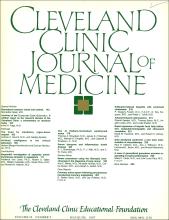ABSTRACT
The authors used a computer-based protocol to evaluate the significance of elevations in aspartate aminotransferase (AST) activity in outpatients undergoing periodic health examinations. The protocol was used to systematically guide the performance of confirming secondary tests when the initial AST activity was elevated. Interpretation of all laboratory results was computer generated by an EXPERT artificial intelligence program developed by the authors. Implementing this system in a laboratory-based accelerated testing program resulted in the investigation of 79 AST elevations in 3,096 outpatients; 93% of these results were confirmed by secondary testing and represented apparent alcohol-induced liver dysfunction, hepatitis (including HBV), unclassified liver dysfunction, muscle insult, or hypothyroidism. This laboratory testing protocol appears to be an attractive alternative to traditional laboratory screening.
- Received September 1986.
- Accepted November 1986.
- Copyright © 1987 The Cleveland Clinic Foundation. All Rights Reserved.






